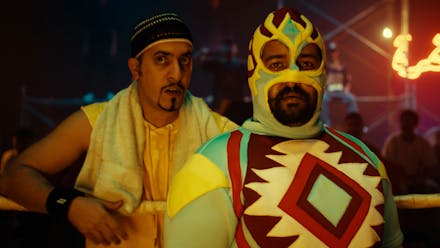Everyone loves an underdog story, especially in the world of sports. Little wonder, then, that freestyle wrestling comedy Sattar — which proved to be such a hit at home in Saudi Arabia that it knocked Avatar: The Way of Water off the box office top spot — is getting a theatrical release in the UK. It’s only the second Saudi film to receive a British cinema release, after Haifaa al-Mansour’s excellent feminist coming-of-age film Wadjda. While humorously spirited, Sattar doesn’t quite reach the same lofty storytelling heights of that film; still, there’s certainly enough everyman charm in lead Ibrahim Al Hajjaj — akin to Simon Pegg and Nick Frost’s — to appeal to moviegoers beyond the UK’s Arab demographic and keep you invested in Saad’s journey.

Al Hajjaj, a popular Saudi Arabian actor and stand-up comedian, undoubtedly has a brilliant knack for comic timing. His brow-beaten insurance worker with a secret wrestling obsession shifts personalities depending on his circumstances – mundane with coworkers, coy with his fiancé and mother-in-law, or intensely energised when re-enacting classic wrestling scenarios with action figures. He's a joy to watch, as is his lack of self-consciousness when it comes to performing the painful wrestling scenes, which director Abdullah Al-Arak realises with slapstick zeal. There’s a kitschness to the production design of this underground wrestling world, where Saad takes a fair few brutal beatings before a couple of textbook, yet animatedly-edited, montage training scenes put him on the winning track.

Saad’s manager Ali Hogain (Abdulaziz Alshehri) — who has based his entire image on Hulk Hogan — brings an intense, eye-bulging mirth to proceedings, and his deep-throated, baritone delivery helps the jokes land harder. But the setup to their partnership, and the repetitive introduction of new oddball fighters for Saad to face, slows the pace, before the script (by Ibraheem Alkhairallah and Ayman Wattar) delivers a few plot twists and turns.
Sattar is not breaking the formula for this sort of sporting jest. And for all its amusing floundering masculine energy, its female characters are still one-note stereotypes. It’s certainly closer to Cuban Fury than Dodgeball — but there’s enough physical comedy, dry wit, fun character beats and a sick Arab rap soundtrack to earn your cheers.
